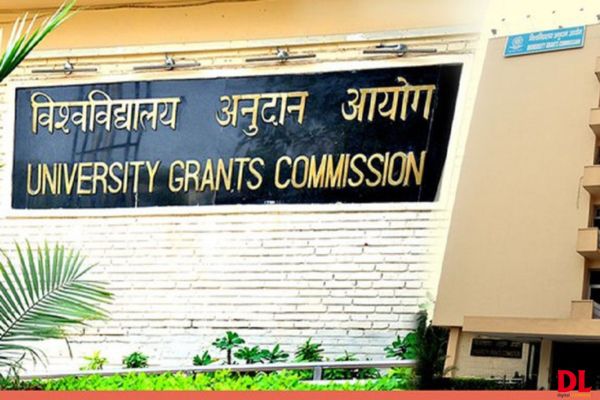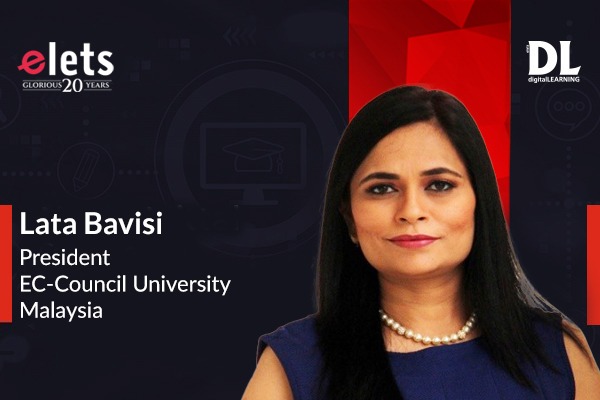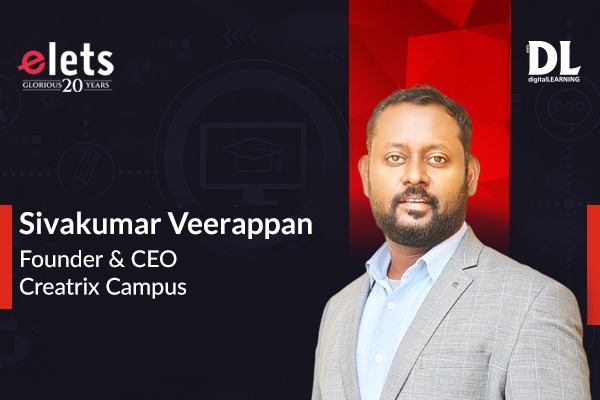EC-Council University’s contribution to Malaysia’s reputation as a cyber security education and research center is significant. Through our specialized degree programs, partnerships with industry leaders, research initiatives, and awareness campaigns, we are equipping individuals with the knowledge and skills necessary to protect organizations from cyber threats, shared Lata Bavisi, President, EC-Council University, Malaysia, in an exclusive conversation with Sheeba Chauhan of Elets News Network. Edited excerpts:
As the President of EC-Council University, what is your vision for the institution’s role in cyber security education, especially in the context of growing digital threats and cyber challenges?
My vision for EC-Council University’s role in cyber security education is to be at the forefront of addressing growing digital threats and cyber challenges. In today’s increasingly digital world, the importance of cyber security cannot be overstated. The ever-evolving nature of cyber threats requires us to stay ahead of the curve and equip our students with the knowledge, skills, and resources they need to effectively combat these challenges.
First and foremost, at EC-Council University, we are focused on providing comprehensive and cutting-edge cyber security education. This means regularly updating our curriculum to align with the latest industry developments and trends. This is a pertinent requirement as cyber security evolves every day with the evolution of technology. By collaborating with industry experts and staying informed about emerging threats, we ensure that our students are trained in the most relevant and up-to-date cyber security practices.
In addition to the technical aspects of cyber security, EC-Council University also focuses on delivering a holistic approach to cyber security education. This includes cultivating a mindset of critical thinking, problem-solving, and ethical decision-making. Cyber security professionals need to not only possess technical expertise but also understand the broader implications and ethical considerations surrounding cyber security.
Another critical aspect of our vision for cyber security education at EC-Council University is inclusivity. The field of cyber security is currently facing a significant shortage of skilled professionals, and this shortage is even more pronounced among marginalized groups. Our scholarship programs are a testament to our commitment to making education accessible and inclusive. By providing opportunities to individuals from various backgrounds and demographics, we aim to create a vibrant community of cyber security professionals who bring unique perspectives and insights to the table and we attempt to close the gap created by digital inequalities.
Furthermore, EC-Council University should also strive to be a global leader in cyber security research and innovation. This includes actively engaging in research collaborations with other institutions, industry partners, and governmental organizations. By conducting cutting-edge research, we can contribute to the development of new technologies, strategies, and policies that will strengthen cyber security defenses and mitigate cyber risks.
Overall, my vision for EC-Council University’s role in cyber security education is to empower our students to become the next generation of cyber security leaders. By providing them with comprehensive education, emphasizing critical thinking and ethical considerations, fostering inclusivity, and actively engaging in research and innovation, we can play a critical role in addressing the growing digital threats and cyber challenges of today and the future.
Could you share insights into the unique programs and learning approaches offered by EC-Council University to equip students with practical cyber security skills?
At EC-Council University, we provide our students with the practical cyber security skills they need to excel in the industry. We have developed unique programs with a strong foundation of hands-on training, real-world experience, and learning approaches that address the evolving trends and challenges in the cyber security field.
Our programs stand out with a critical focus on hands-on learning, recognizing the significance of practical experience in cyber security. With over 200 hands-on lab exercises, we bridge the gap between theory and practice, equipping graduates with essential research and soft skills necessary for success in the industry. Our state-of-the-art cyber range facilitates simulations and defense against cyber threats in a controlled environment, enabling students to gain valuable experience and develop problem-solving abilities crucial to the industry. Through practical training, including virtualized environments, we ensure students grasp theoretical concepts and attain the proficiency to address real-world challenges in cyber security.
Another unique aspect of our programs is the integration of industry-recognized certifications from EC-Council. We have integrated many renowned certifications into our curriculum, like the Certified Ethical Hacker (CEH) and Certified Network Defender (CND). Certifications like these provide students with a comprehensive understanding of various aspects of cyber security and enable them to gain practical skills that are highly sought after by employers. Our students can enter the job market with a competitive edge by obtaining these certifications.
EC-Council University has experienced Faculty with industry expertise and stellar academic credentials, with most of them having PhDs, guiding learning in every degree or certificate program through live sessions and discussions. For instance, one of our leading Faculty is the industry thought leader and New York Times bestselling author, Dr. Yuri Diogenes, who is also the Principal PM Manager at Microsoft Cloud Security Group, where he manages a team of PMs for their security posture management and workload protection solution, Defender for Cloud.
Furthermore, EC-Council University promotes collaboration and networking among its students and industry professionals. Learning and growth are enhanced when students interact with field experts. We organize guest lectures and webinars (CyberTalks) where students can connect with leading cyber security professionals and gain insights into the latest trends and practices in the industry. This networking opportunity allows students to build valuable connections and broaden their understanding of the field.
In addition to these unique programs and learning approaches, EC-Council University offers flexible online learning options. This allows students to pursue their education at their own pace and convenience, making it easier for working professionals or those with other commitments to join our programs and develop the necessary skills to succeed in the dynamic field of cyber security.
Malaysia is emerging as a hub for cyber security. How is EC-Council University contributing to Malaysia’s reputation as a center for cyber security education and research?
EC-Council University takes pride in being part of Malaysia’s establishment as a cyber security hub through its parent organization, EC Council. As a leading online, US-accredited cyber security University, we offer specialized degree and certificate programs tailored to meet industry demands, producing highly skilled professionals. Our programs equip students with the necessary knowledge and skills to combat cyber threats and contribute to Malaysia’s cyber security sector. Through collaborations with industry partners, students gain real-world experience and stay updated with the latest trends and challenges in the field. Additionally, our faculty members, respected experts in their respective areas, actively contribute to research and development activities, enhancing our understanding of cyber threats and striving to advance the field of cyber security.
In addition to our academic programs and research efforts, our parent organization, EC-Council, a global leader in cyber security certifications and the creator of the world-renowned Certified Ethical Hacking credentials, is a well-known provider of training programs and certifications for professionals and organizations in Malaysia. They offer online courses and certifications to help individuals prioritize cybersecurity and privacy in today’s digital world. They also train organizations in various sectors to enhance their staff’s security awareness. EC-Council Academia partnership in Malaysia supports educators in building world-class cyber programs by offering authorized learning resources for students. Additionally, they help partners achieve operational efficiency and increase revenue generation potential through their reseller program.
In July this year, EC-Council, in association with the Malaysian National Cyber Security Agency (NACSA), granted USD 1 Million worth of scholarships during the CyDES 2023 event, witnessed by the Prime Minister of Malaysia, Datuk Seri Anwar Ibrahim. This initiative aims to empower Malaysia’s youth and businesses in cybersecurity, addressing the country’s rising cyber incidents. With specialized education in ethical hacking, incident response, and network defense, scholarship recipients will be equipped to detect, mitigate, and respond to evolving cyber threats. With EC-Council, NACSA, and the Prime Minister’s support, Malaysia is on its way to a secure, prosperous digital future.
In conclusion, EC-Council University’s contribution to Malaysia’s reputation as a cyber security education and research center is significant. Through our specialized degree programs, partnerships with industry leaders, research initiatives, and awareness campaigns, we are equipping individuals with the knowledge and skills necessary to protect organizations from cyber threats. We are proud to be part of Malaysia’s growing cyber security sector. We remain committed to continually enhancing our programs and initiatives to further contribute to the nation’s reputation in the field.
In the age of remote work and digital transformation, what new challenges and opportunities do you see for cyber security education, and how is EC-Council University addressing them?
The age of remote work and digital transformation has significantly impacted cyber security education, presenting both unique challenges and promising opportunities. The global shift towards remote work has accelerated the demand for cyber security professionals with the knowledge and skills to protect sensitive data in distributed environments. This has created an urgent need for cyber security education programs addressing the specific challenges of remote work and digital transformation.
First and foremost, EC-Council University acknowledges that remote work has expanded the attack surface for cyber threats. With employees accessing sensitive data and systems from various locations and devices, the potential for security breaches and data leaks has exponentially increased. To address this challenge, we have adapted our curriculum to emphasize the importance of securing remote work environments and implementing robust security protocols that can withstand evolving cyber threats. Our courses now include modules covering secure remote access, virtual private networks, and multi-factor authentication.
Additionally, digital transformation has brought about a surge in the reliance on cloud computing, the Internet of Things (IoT), and artificial intelligence (AI) technologies. While these advancements offer numerous benefits, they also introduce new vulnerabilities and risks to organizations. To tackle these evolving challenges head-on, EC-Council University has incorporated specialized courses that provide students with a deep understanding of securing cloud-based infrastructures, protecting IoT devices, and mitigating AI-related threats. By equipping our students with these cutting-edge skills, we ensure they are well-prepared to navigate the complexities of the ever-changing digital landscape.
In terms of opportunities, the age of remote work and digital transformation has allowed for greater accessibility and reach in cyber security education. With the advancements in online learning platforms and remote collaboration tools, individuals worldwide can access high-quality cyber security education regardless of their geographical location. EC-Council University has harnessed these opportunities by expanding our online course offerings and developing interactive virtual labs that emulate real-world scenarios. Through these initiatives, we enable students to gain hands-on experience in a secure and remote learning environment, preparing them for the realities of the evolving cyber landscape.
Furthermore, the increased reliance on remote work has highlighted the critical need for professionals with technical expertise and soft skills such as effective communication, problem-solving, and adaptability. EC-Council University recognizes this shift in the industry, and we have integrated soft skills development into our curriculum. We provide students opportunities to enhance their interpersonal and communication skills through group projects, presentations, and a curriculum that has varied focus on such development. By developing well-rounded cyber security professionals who excel not only in technical competencies but also in collaboration and communication, we empower them to successfully navigate the challenges of remote work, along with a keen focus on ethical considerations.
One area of concern for educators is the speed with which technology and AI are disrupting every segment of the industry, including education. It is the responsibility of educators like ECCU to ensure that our curriculum, teaching practices, and how learners engage, comprehend, and apply the knowledge, skills, and abilities keep up with the pace of technology evolution. This will mean a curriculum that is more apt for the current age learner, professional development of our faculty and learning appeal of our students to ensure that they are able to apply the knowledge and skills acquired during their learning journey in real life for both their personal and professional benefit.
In conclusion, the age of remote work and digital transformation has presented challenges and opportunities for cyber security education. EC-Council University has proactively addressed these by adapting our curriculum to focus on securing remote work environments, incorporating courses on emerging technologies, expanding our online course offerings, and developing soft skills. By equipping our students with the latest knowledge, skills, and competencies, we ensure that they are well-prepared to protect organizations from evolving cyber threats and contribute to the advancement of cyber security in this digital era.
Could you elaborate on any ongoing research or innovation projects at EC-Council University that are contributing to advancements in the field of cyber security?
At EC-Council University and the group organization, we are committed to spearheading research and innovation projects that contribute to advancements in the field of cyber security. Our ongoing research initiatives focus on various areas, including emerging threat intelligence, blockchain security, secure software development, digital forensics, cryptography, and artificial intelligence. Our faculty and students are actively involved in projects that address real-world cyber security challenges. The insights gained from these projects inform our curriculum and educational approach, ensuring that our students are at the forefront of cyber security knowledge and skills.
One prominent ongoing research project at EC-Council University involves studying emerging threats in the cyber landscape. This project aims to identify and analyze new types of cyber-attacks and develop effective countermeasures. By staying ahead of the curve, we can proactively train our students and professionals to mitigate novel risks and protect critical information infrastructure.
Another significant area of research is secure software development. With technology becoming increasingly pervasive, the security of software applications has become a critical concern. The project focuses on developing secure software engineering practices, including techniques for identifying vulnerabilities, implementing safe coding standards, and conducting thorough security testing. By integrating safe development practices at the core of software engineering, we aim to produce a new generation of professionals capable of designing and building secure applications.
Digital forensics is another crucial aspect of cyber security research at EC-Council University. In collaboration with law enforcement agencies and industry partners, we aim to develop advanced techniques for investigating cybercrimes and gathering digital evidence. Our research focuses on memory forensics, network forensics, and mobile device forensics. By advancing digital forensics methodologies, we can ensure digital evidence’s integrity, admissibility, and accuracy in the pursuit of justice.
Through these ongoing research and innovation projects, EC-Council University aims to contribute to advancements in the field of cyber security. By fostering a collaborative environment, leveraging our academic expertise, and collaborating with industry partners, we are determined to produce cyber security professionals equipped to face the challenges of the future and become cyber security leaders who champion change and are the pioneers of digital security.


























